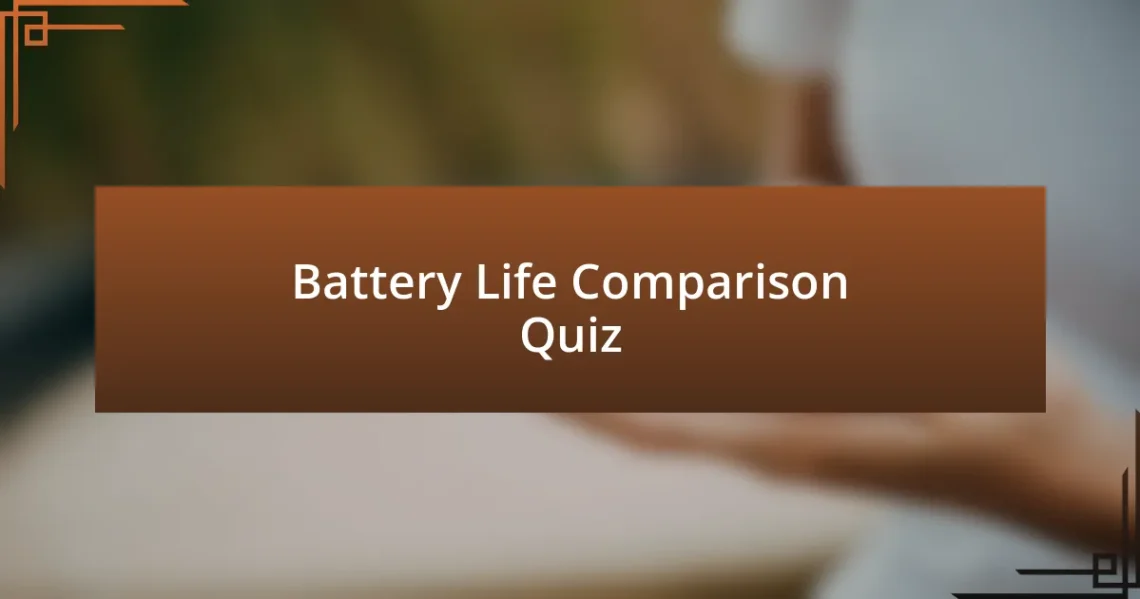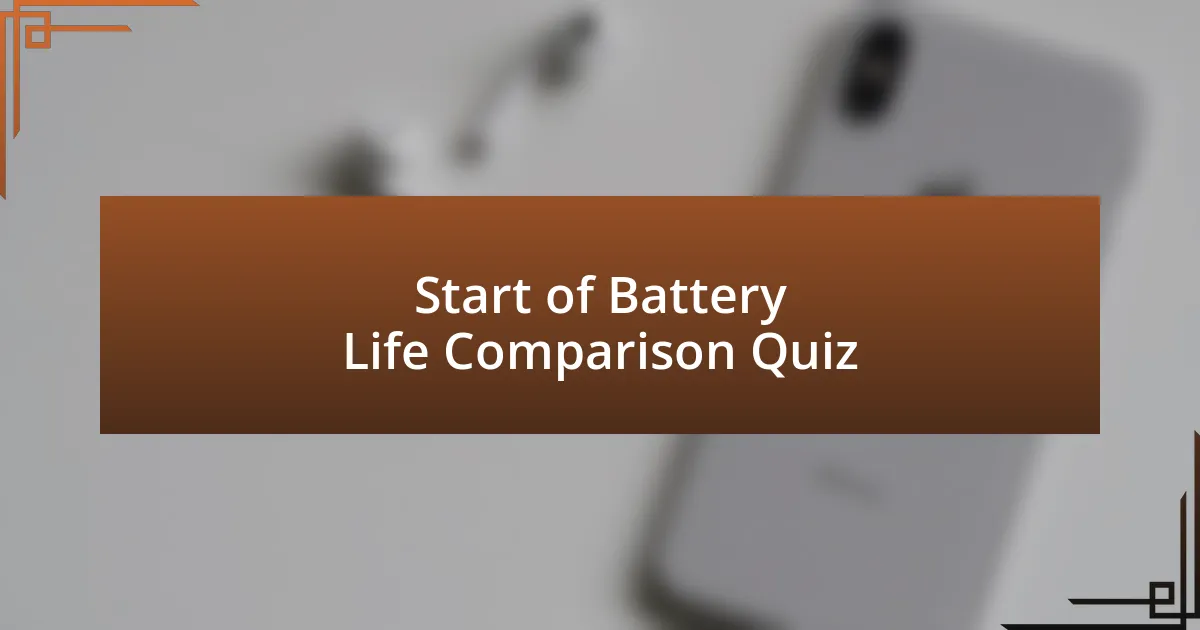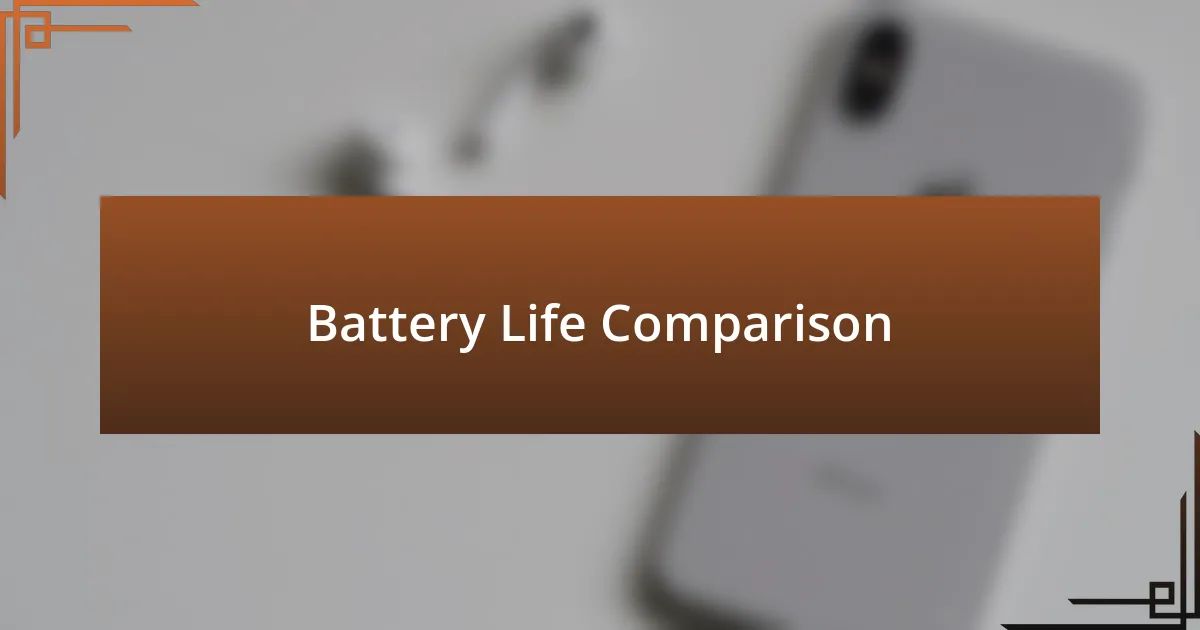
Battery Life Comparison Quiz

Start of Battery Life Comparison Quiz
1. Which brand of battery was more consistent during a test if Brand A has a standard deviation of 5.2 and Brand B has a standard deviation of 0.6?
- Brand C
- Brand D
- Brand A
- Brand B
2. What is the standard error of the sample mean for a sample of 16 batteries with a mean battery life of 4.3 hours and a standard deviation of 1.00 hour?
- 0.10 hours
- 0.75 hours
- 0.50 hours
- 0.25 hours
3. What is the probability that a battery will last more than 1,000 days if the average length of life is 1,120 days with a standard deviation of 120 days?
- Approximately 0.75
- Approximately 0.60
- Approximately 0.25
- Approximately 0.40
4. What percentage of batteries will last less than 400 charges if the average life-span is 450 charges with a standard deviation of 50 charges?
- Approximately 25.0% of batteries will last less than 400 charges.
- Approximately 5.0% of batteries will last less than 400 charges.
- Approximately 50.0% of batteries will last less than 400 charges.
- Approximately 16.7% of batteries will last less than 400 charges.
5. Which smartphone battery lasts the longest in browsing mode?
- The Samsung Galaxy S21 has a battery life of 12 hours.
- The Apple iPhone 14 has a battery life of 18 hours.
- The Asus Zenfone 10 battery lasts the longest in browsing mode, with an estimated 27 hours and 28 minutes.
- The OnePlus 9 has a battery life of 20 hours.
6. What type of chemical reactions are involved in generating electricity in batteries?
- Acid-base reactions are involved.
- Combustion reactions are involved.
- Polymerization reactions are involved.
- Oxidation-reduction (redox) reactions are involved.
7. What is the composition of Volta’s first battery?
- Alternating layers of gold and silver with plastic insulation.
- Stacked copper and zinc discs separated by cardboard soaked in saltwater.
- Layered aluminum and iron plates placed in water.
- Single block of lead immersed in soda solution.
8. In which direction do lithium ions flow when the battery is being discharged?
- From the negative terminal to the positive terminal
- From the electrolyte to the separator
- From the cathode to the anode
- From the anode to the cathode
9. What is the average life of a flashlight battery produced by a northern manufacturer?
- 45 hours
- 90 hours
- 30 hours
- 60 hours
10. What percentage of batteries will last more than 93% if the life of cell batteries is normally distributed with a mean of 84.9 hours and a standard deviation of 18.5 hours?
- Approximately 5% of batteries will last more than 93 hours.
- Approximately 16.7% of batteries will last more than 93 hours.
- Approximately 95% of batteries will last more than 93 hours.
- Approximately 1% of batteries will last more than 93 hours.
11. What length of operational life is exceeded by 10% of batteries from a manufacturer with a mean of 43 hours and a standard deviation of 5 hours?
- Approximately 45.5 hours
- Approximately 40 hours
- Approximately 50 hours
- Approximately 38 hours
12. What percent of overcharged batteries will last less than 11.5 hours if the mean life is 12 hours and the standard deviation is 1 hour?
- Approximately 50% of overcharged batteries will last less than 11.5 hours.
- Approximately 25% of overcharged batteries will last less than 11.5 hours.
- Approximately 10% of overcharged batteries will last less than 11.5 hours.
- Approximately 75% of overcharged batteries will last less than 11.5 hours.
13. What is the average capacity of batteries if a random sample of 20 batteries had a mean of 138.47 ampere-hours and a standard deviation of 2.66 ampere-hours?
- 140.00 ampere-hours
- 138.47 ampere-hours
- 130.00 ampere-hours
- 135.00 ampere-hours
14. What is the probability that the average length of life of 900 automobile batteries selected is less than 1,000 days if the mean length of life is 1,120 days with a standard deviation of 120 days?
- The probability is approximately 0.50.
- The probability is approximately 0.25.
- The probability is approximately 0.10.
- The probability is approximately 0.75.
15. What is the margin of error for a sample mean battery life of 145 hours with a sample standard deviation of 21 hours and a sample size of 80?
- The margin of error is approximately 2 hours.
- The margin of error is approximately 4 hours.
- The margin of error is approximately 5 hours.
- The margin of error is approximately 3.5 hours.
16. What is the third quartile (75th percentile) of the lifetime of car batteries with a mean of 1,095 days and a standard deviation of 120 days?
- Approximately 1,100 days
- Approximately 1,400 days
- Approximately 1,195 days
- Approximately 1,300 days
17. Which smartphone battery has the shortest battery life in gaming mode?
- The Apple iPhone 14 Pro
- The Samsung Galaxy S23
- The Google Pixel 7
- The OnePlus 11
18. What is the probability that a battery will last more than 13 hours if the mean life is 12 hours and the standard deviation is 1 hour?
- The probability is approximately 0.25.
- The probability is approximately 0.5.
- The probability is approximately 0.75.
- The probability is approximately 0.1.
19. What is the average lifespan of cell-phone batteries if they have an average life-span of 450 charges with a standard deviation of 50 charges?
- 500 charges
- 600 charges
- 450 charges
- 400 charges
20. What is the probability that a randomly selected battery will last more than 3.2 hours if the mean lifetime is 3.2 hours with a standard deviation of 0.1 hours?
- The probability is approximately 0.5.
- The probability is approximately 0.9.
- The probability is approximately 0.3.
- The probability is approximately 0.75.
21. What is the average life of a certain type of automobile battery if it lasts an average of 1,140 days with a standard deviation of 80 days?
- 1,140 days
- 1,340 days
- 1,200 days
- 960 days
22. What is the probability that a randomly selected battery will last less than 11.5 hours if the mean life is 12 hours and the standard deviation is 1 hour?
- Approximately 75% of batteries will last less than 11.5 hours.
- Approximately 50% of batteries will last less than 11.5 hours.
- Approximately 10% of batteries will last less than 11.5 hours.
- Approximately 25% of batteries will last less than 11.5 hours.
23. What is the probability that a randomly selected battery will last more than 13 hours if the mean life is 12 hours and the standard deviation is 1 hour?
- The probability is approximately 0.25.
- The probability is approximately 0.75.
- The probability is approximately 0.90.
- The probability is approximately 0.5.
24. What is the average lifespan of car batteries if they have an average life-span of 1,095 days with a standard deviation of 120 days?
- The average lifespan is 1,150 days.
- The average lifespan is 1,000 days.
- The average lifespan is 1,200 days.
- The average lifespan is 1,095 days.
25. Which smartphone battery has the longest battery life in gaming mode?
- The OnePlus 10 Pro
- The Honor Magic6 Pro
- The Samsung Galaxy S23
- The iPhone 14 Pro
26. Which smartphone battery has the shortest battery life in browsing mode?
- Samsung Galaxy S23
- Xiaomi Mi 13
- OnePlus 11
- Google Pixel 7 Pro
27. Which smartphone brand has a battery with a standard deviation of 0.6, indicating more consistent performance compared to others?
- Brand B
- Brand A
- Brand D
- Brand C
28. What calculation results in a standard error of 0.25 hours for a sample mean battery life of 4.3 hours from 16 batteries?
- The standard error of the sample mean is 0.25 hours.
- The standard error of the sample mean is 0.5 hours.
- The standard error of the sample mean is 0.75 hours.
- The standard error of the sample mean is 1.0 hours.
29. If a smartphone battery averages 1,120 days of life with a standard deviation of 120 days, what is the probability that it will last more than 1,000 days?
- Approximately 0.20
- Approximately 0.75
- Approximately 0.90
- Approximately 0.50
30. In a sample of batteries with an average lifespan of 450 charges, what percentage will likely last less than 400 charges given the standard deviation of 50 charges?
- Approximately 16.7% of batteries will last less than 400 charges.
- Approximately 10% of batteries will last less than 400 charges.
- Approximately 25% of batteries will last less than 400 charges.
- Approximately 5% of batteries will last less than 400 charges.

Congratulations! You’ve Successfully Completed the Quiz!
Well done on completing our quiz on Battery Life Comparison! We hope you enjoyed the journey as much as we did. This quiz was designed to help you understand the nuances of battery life across various devices. You may have learned about different battery types, how usage affects lifespan, and the importance of keeping your devices charged optimally.
These insights are valuable as they empower you to make informed choices about your devices. Understanding battery technology can extend the life of your gadgets and improve your daily productivity. Armed with this knowledge, you can better manage your device usage, ensuring you get the most out of their battery life.
If you’re eager to deepen your understanding further, we invite you to check out the next section on this page. It offers a wealth of information on Battery Life Comparison, including tips and tricks for maximizing your devices’ performance. Dive in and expand your knowledge today!

Battery Life Comparison
Understanding Battery Life
Battery life refers to the duration a battery can power a device before requiring a recharge. It is essential for user experience, especially in portable electronics. Different factors influence battery life, including battery capacity, device usage, and background processes. Users typically seek devices with longer battery life for convenience and reduced downtime.
Factors Affecting Battery Life
Several variables impact the battery life of devices. These include screen brightness, processor performance, and the types of applications running. High-performance tasks consume more power, while lower power settings can extend battery life. Additionally, environmental conditions, like temperature, also play a significant role in battery performance.
Comparative Analysis of Battery Life Across Devices
Battery life can vary widely across device categories, such as smartphones, laptops, and tablets. Smartphones typically have a capacity ranging from 3,000 to 5,000 mAh, while laptops can reach 50,000 mAh or more. Tablets generally fall in between these two categories. This highlights the fundamental differences in design and functionality, which directly affect battery longevity.
Battery Life Benchmarking Methods
To compare battery life effectively, standardized testing methods are used. Common benchmarks include continuous video playback, web browsing, and gaming endurance tests. These tests provide a score or average duration that can be reliably compared across different devices. Such methodologies ensure that consumers have clear expectations when purchasing electronics.
Future Trends in Battery Life Technology
Advancements in battery technology aim to improve battery life significantly. Emerging technologies include solid-state batteries and improvements in lithium-ion chemistry. These innovations promise longer life cycles and faster charging times. The ongoing research focuses on enhancing energy density, which directly correlates with longer battery life in devices.
What is battery life comparison?
Battery life comparison is the evaluation of the operational duration of different batteries under similar conditions. This involves measuring how long each battery can power a device before needing a recharge. For instance, lithium-ion batteries typically last longer than nickel-cadmium batteries, with an average discharge rate showing lithium-ion batteries providing 300-500 charge cycles compared to 1500 for nickel-cadmium, but with shorter overall capacity in certain applications.
How is battery life measured?
Battery life is measured in terms of time or cycles until the fully charged battery discharges to a certain percentage, often around 20%. This is evaluated by subjecting the battery to standard tests, such as playing continuous video or using the device for typical tasks. For instance, a smartphone’s battery life can be benchmarked using video playback tests that indicate how many hours the device can run on a full charge.
Where can I find battery life comparisons?
Battery life comparisons can be found in product reviews from reputable technology websites and consumer electronics publications. These sources conduct standardized tests to evaluate different batteries, providing detailed data. For example, sites like CNET and TechRadar frequently publish articles comparing battery life across smartphones, laptops, or electric vehicles, offering consumers insights based on testing in real-world scenarios.
When should battery life comparisons be conducted?
Battery life comparisons should be conducted prior to purchasing devices or batteries to ensure optimal performance for specific usage needs. This is particularly important when considering new devices or when comparing upgrades, such as selecting a laptop or smartphone with a longer-lasting battery before use. Reports from consumer tests are often relevant soon after product launches to inform buying decisions.
Who conducts battery life comparisons?
Battery life comparisons are conducted by independent reviewers, technology analysts, and manufacturers during product testing phases. Companies like Consumer Reports and tech blogs analyze and test battery performance under controlled conditions, ensuring that they provide reliable metrics. Moreover, manufacturers may conduct internal comparisons to publicize advantages of their battery technology over competitors.




